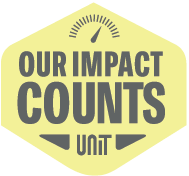I SAID YOU CAN’T SIT WITH US! A Plea for Inclusion in Sustainability Thinking
By Alison Klein | May 4, 2016
Hello down there. My, life must feel different in the TRADITIONAL business world. Are you having fun with your money? Your environmental degradation? Your purposeless pursuit of profit? I thought so. Excuse me while I bask in the way I’ve infused my business operations so effectively with my social Purpose. I’d love to chat more about how much I rock but my organic quinoa bowl is getting cold and my local vegetable medley is nearing room temp. Toodaloo!
I love to see people using business for good but you know what I don’t love? The sense of superiority it can sometimes engender.
Sustainable businesses and companies that pursue the quadruple bottom line give us a glimpse of the future, but it’s going to take the world a lot longer to get there if we segregate ourselves. Don’t get me wrong – it’s positively crucial for likeminded businesses to swap ideas – but collaboration among businesses with different operating models is arguably even more essential to generating widespread change (Click to Tweet!).
Get Pegable blog posts sent right to your inbox for ideas, advice and resources on activating your company’s Purpose.
As social entrepreneur David Floyd describes, people trying to change the world through business need to know about – you know – business. Guess who knows tons about business? Successful business people. Of course there are plenty of smart businesspeople in the fourth sector, but it’s foolhardy to write off the hard-won knowledge of traditional business experts in one fell swoop. They bring expertise to the table that would be irresponsible to ignore.
Big “evil” corporations also have the purchasing power needed to create significant positive impact. There’s meaning in making life better for three coffee farmers, but if you would reject out of hand a big name business looking to collaborate, you’re limiting your power to do good at scale.
We need to stop looking at companies as good and bad, “us” and “them.” It’s more accurate and infinitely more helpful to think of every business as a unique entity existing along a continuum of positive – or negative – environmental and social impact. Each company and each model has different strengths, weaknesses and opportunities. The real goal should be to encourage every business to work consistently toward the beneficial side of the spectrum.
I don’t believe that values including fairness, opportunity, equality, general prosperity and the like are exclusive to people working in the fourth sector or nonprofits or government. We’re just lucky enough to be part of organizations that operate explicitly with the goal of achieving these things. The more we can do to interact with traditional businesses and SHOW THEM how [practically universal] human values can be successfully and profitably integrated in business operations, the more good we can do.
We have to lead by example and educate through collaboration rather than denouncing those at other points in their sustainability journeys.
The Elephant in the Room
The problem, of course, comes when consumers confuse progress in a company’s sustainability journey with success. If they don’t understand all of the different considerations that go into minimizing harm and creating benefit, they can’t make purchasing decisions that reflect their convictions and continue to move the market toward ethicality and sustainability.
A businessperson can hold a value near and dear but it’s only when consumers share — and recognize — that value that acting on it as a business yields success. As marketers, we need to make it easy for consumers to understand the context around what they’re buying so their purchasing decisions can drive continuous improvement across measures of environmental and social impact. That forward movement assures businesses all along the spectrum that working toward doing more good isn’t just nice – it’s good business. That’s what’s needed for widespread change.
It’s not fair to look at companies operating at different points on the spectrum and accuse them of malicious “goodwashing” just because they aren’t on par with organizations further along in their movement toward creating positive change.
Is it goodwashing when a not-universally-awesome company promotes an isolated sustainability or social impact effort? Maybe if it fails to contextualize the story. Definitely if it uses language meant to mislead. Most definitely if the company is still discreetly conducting harmful activities with a flagrant disregard for the values it claims publicly to espouse. Still, just because a company isn’t the best doesn’t mean that its celebrating progress is a scam.
It’s not our job to scream “Lies! We’re the wheat and you’re the chaff!” every time a more traditional company takes a step toward sustainability. Inconsistencies and areas for improvement should be brought to light not with haughty remarks but with encouragement and advice as well as support in rectifying transgressions, intentional or not.
In the movie Mean Girls, Gretchen, Regina and Karen sit at a table together in the high school cafeteria. Gretchen says to her “friend” “Regina, you’re wearing sweatpants. It’s Monday.” “So?” asks Regina. “So,” replies mutual “friend” Karen, “that’s against the rules and you can’t sit with us.”
Let’s not act like mean girls when the fate of people and planet depend on widespread change. Let’s welcome anyone interested to be our partner in impact and to sit with us in the gigantic cafeteria that is our world. How do you think we can incite more impactful collaboration across sectors? I’d love to hear your thoughts in the comments below.



